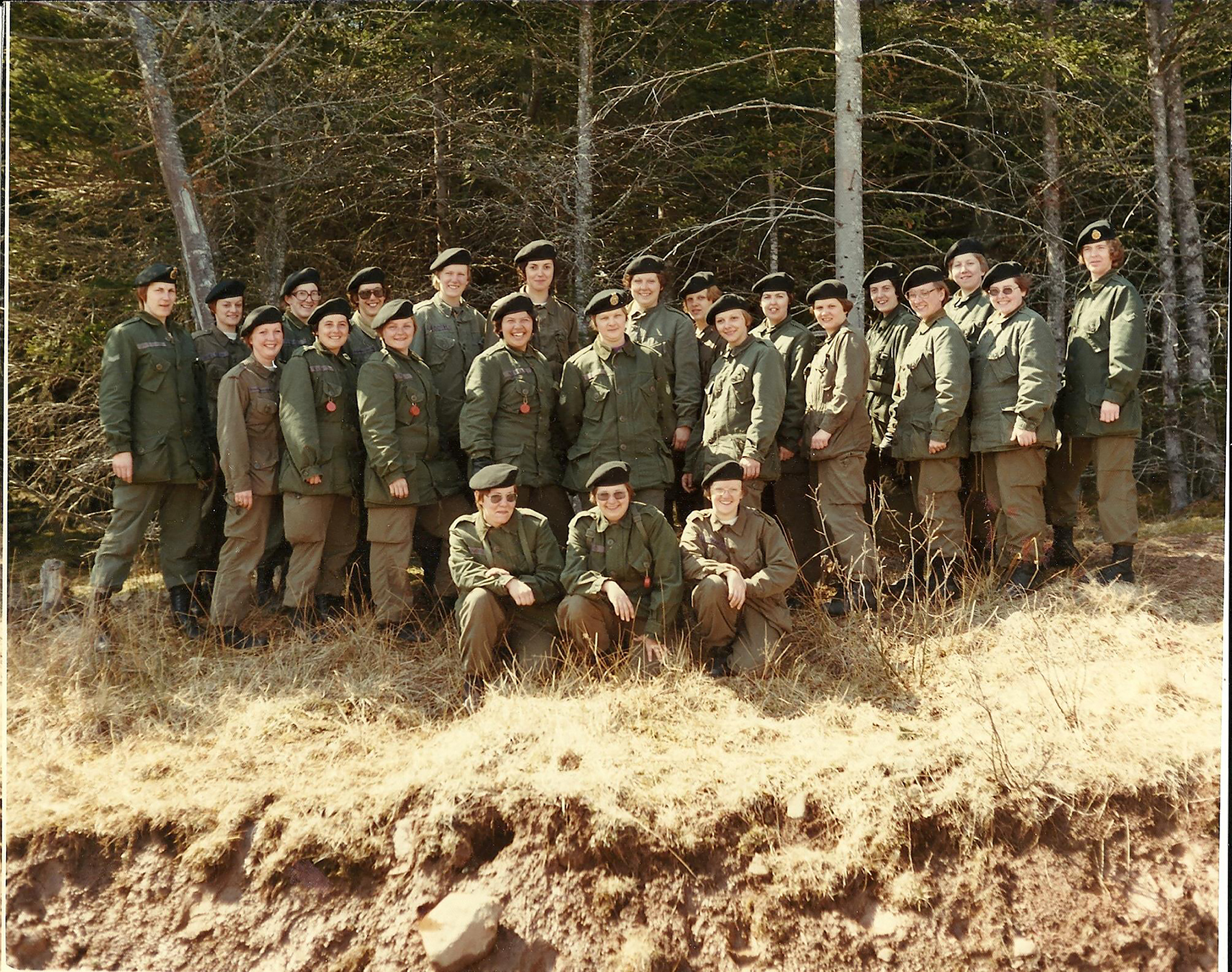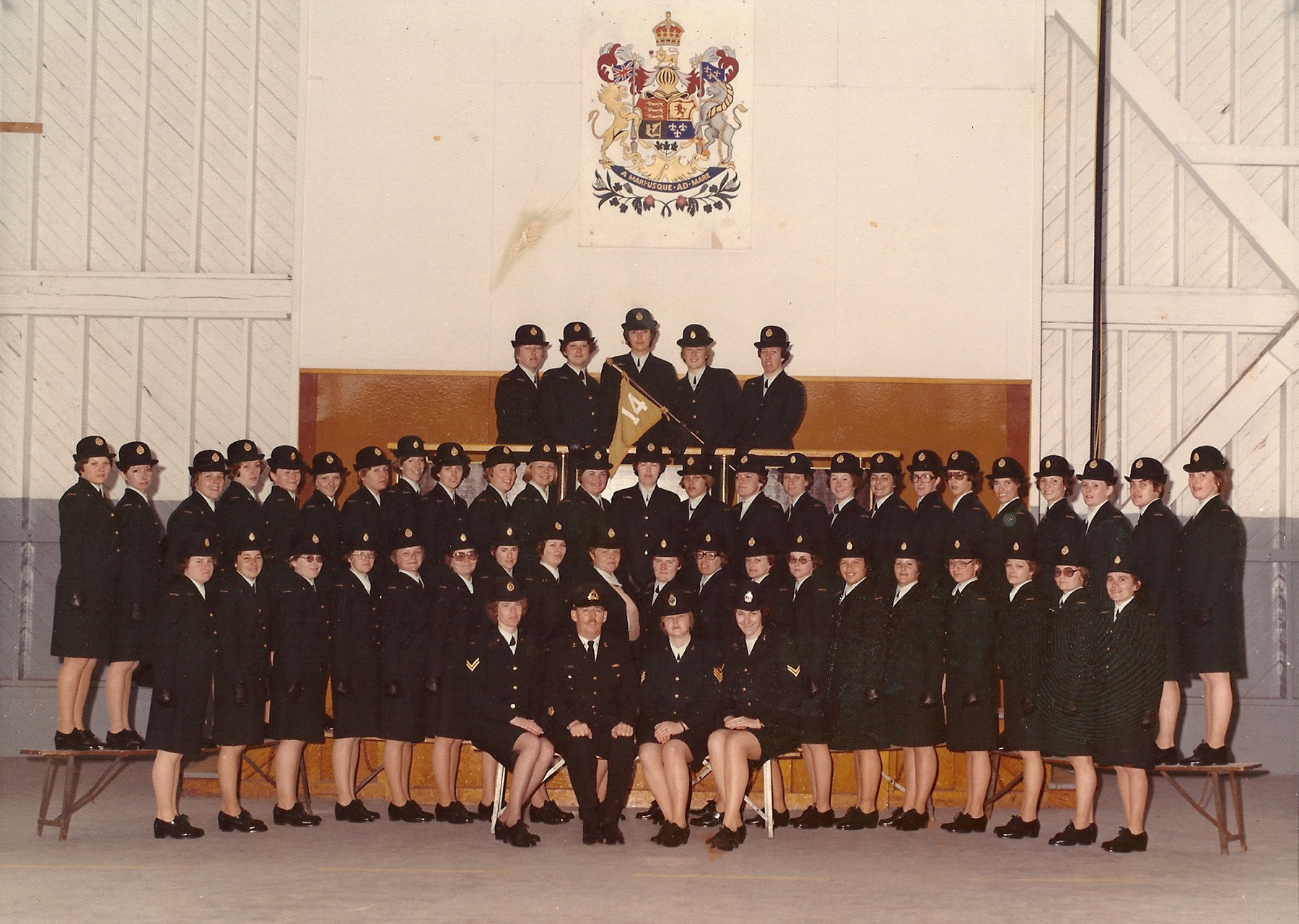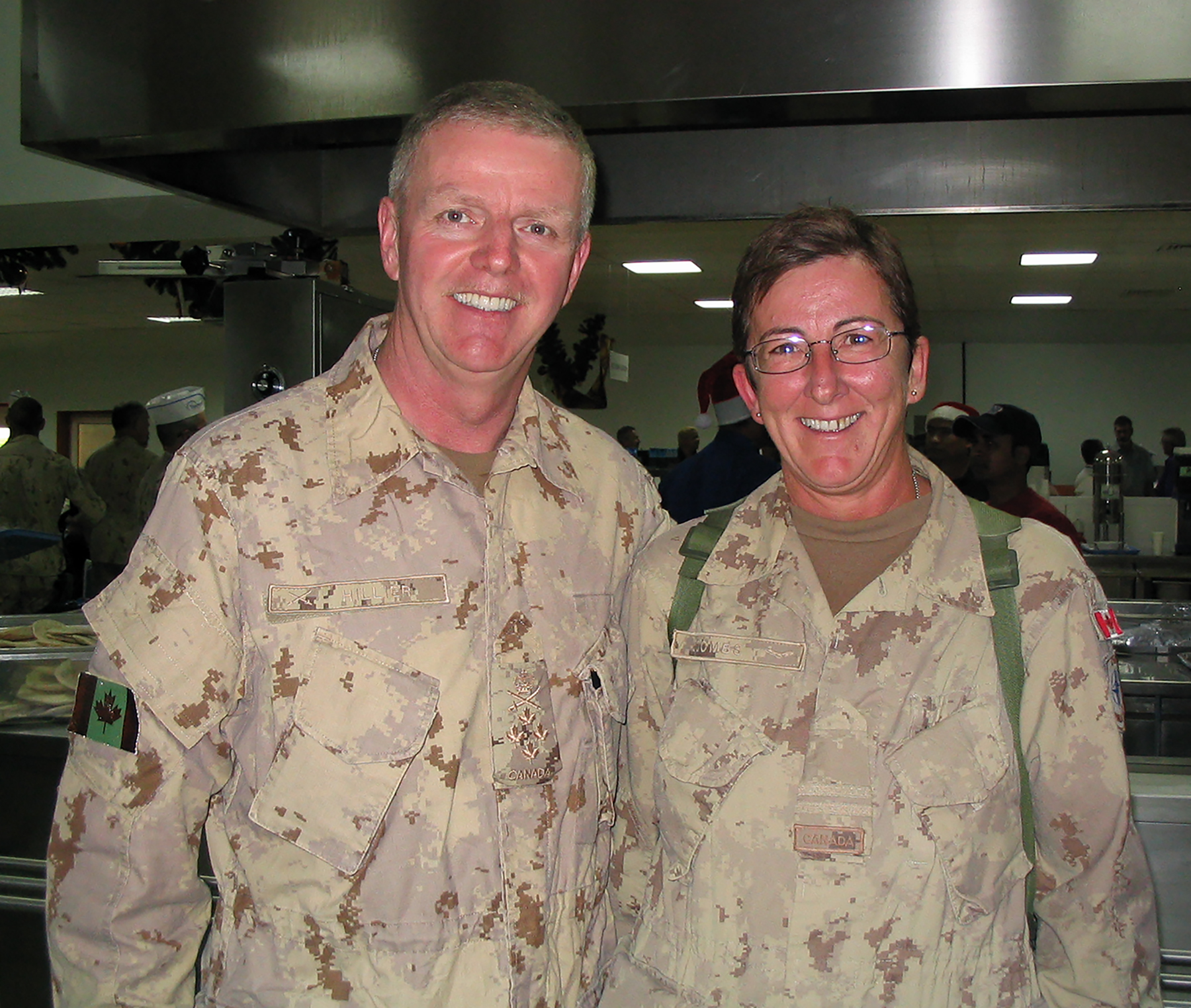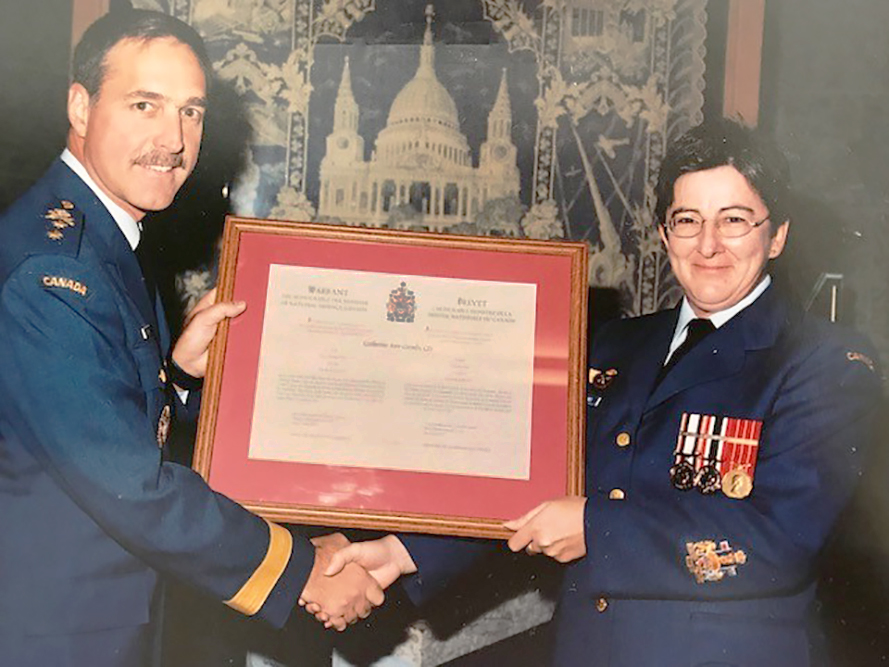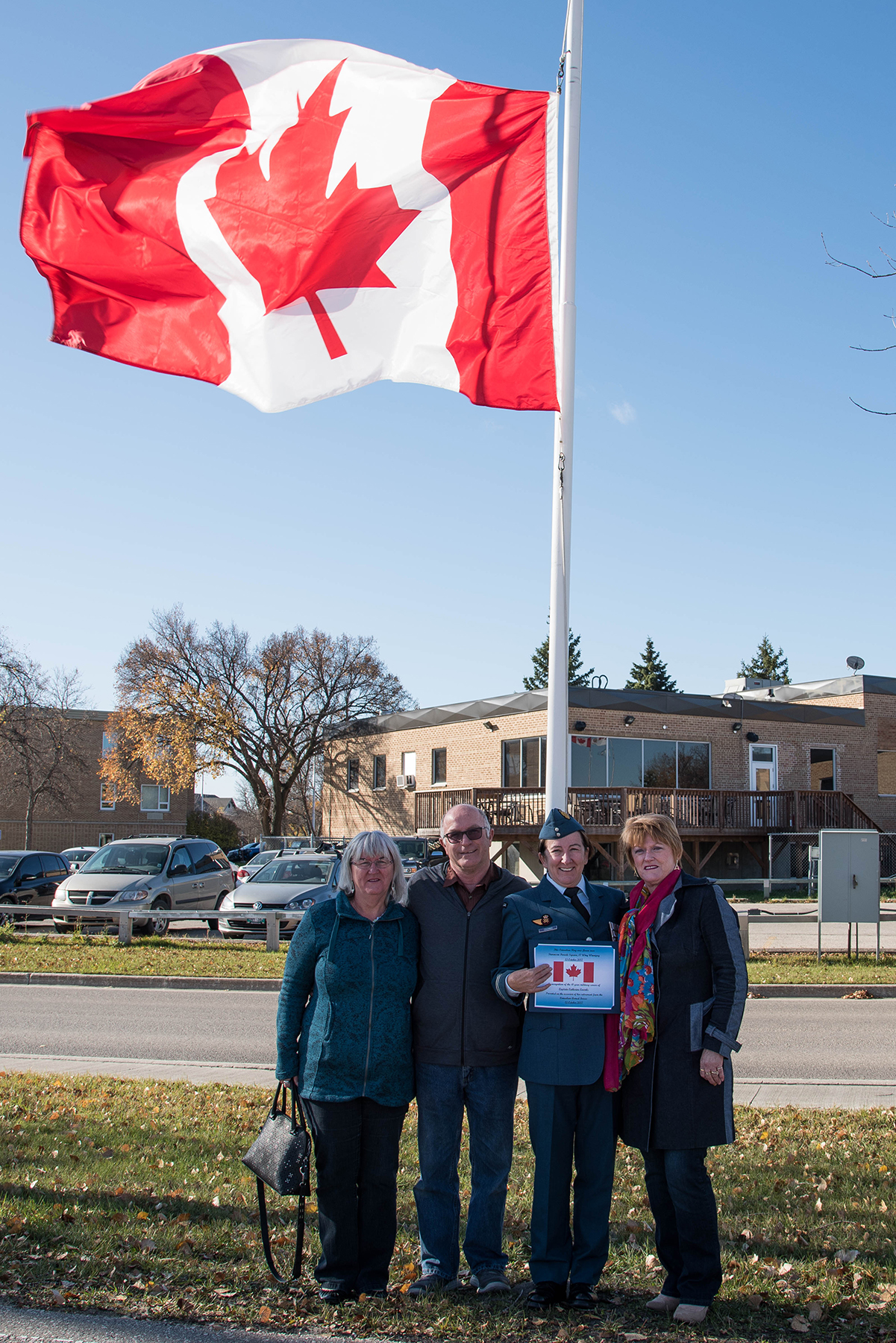Captain Cathy Coombs: An inspiring career
News Article / December 1, 2017
Click on the photo under “Image Gallery” to see more photos.
By Officer Cadet Kylie Penney
When Captain Catherine (Cathy) Coombs went to a recruiter in Sydney, Nova Scotia, as a 17-year-old in 1976, she never imagined the kind of remarkable career she would have in the Canadian Armed Forces (CAF).
At the time, she was one of seven children looking for a way to make a living in an economy that was dominated by a male workforce. She saw her enrolment as a way to provide for herself and as a way to travel the world. Forty-one years later, she has decided it’s time to retire from a career that gave her everything she wanted, and which she describes as “something I always loved to do”.
Captain Coombs’ first step in her career was basic training in Cornwallis, Nova Scotia. From there she went to Borden, Ontario, for training as a supply technician. At the time, there was a big push to get women into the CAF, and, she says, “When I went through my supply course, it was all women, with the exception of two men, but all of the instructors were men.”
Upon graduating from her supply course, she was posted to Winnipeg, Manitoba. Despite enjoying the new opportunities the military was providing, it was not love at first sight. “I went to Cornwallis, then Borden, then Winnipeg,” she says. “I didn’t even know where Winnipeg was. And then, for the next year, I wanted to get out of the CAF but I didn’t know how. Eventually, I just got used to it.”
During her initial transition period to life in the military, there were a few things that helped convince her to stay: the friends she met and the social life within the CAF, and the quality of training that the CAF offered. Taking care of each other was an important part of the culture, as it still is, and helped get members through tough times. “When we were young we didn’t go anywhere unless all of us went,” Captain Coombs says. “The mess was a hopping place back then. It was the place to be on a Friday night and was always packed. We had lots of fun.”
The fun on Friday nights was offset by the hard work during the week. During Captain Coombs’ first two years in Winnipeg, she trained five days a week to become proficient in her occupation. The quality of the training she received helped her persevere through the first year of being away from home, and helped her realize that this is what she was meant to do as a career. Winnipeg’s on-the-job-training (OJT) program earned her praise. “Supply had a great OJT program,” she says, “and I went from desk to desk learning every part of the job for two years to get my book signed off. They took good care of us, and there were enough women that we stuck together and took care of each other.”
Over the next 33 years in the Regular Force, Captain Coombs served at Canadian Forces Station (CFS) Gypsumville, about 250 kilometres north of Winnipeg, Manitoba; National Defence Headquarters in Ottawa, Ontario; Lahr, Germany; CFS Debert, Nova Scotia; Camp Aldershot in Kentville, Nova Scotia; Canadian Forces Base Greenwood, also in Nova Scotia, and 1 Canadian Air Division Headquarters, in Winnipeg, Manitoba. As a woman in the Forces, each posting came with its own set of challenges. In the early years, respect was hard to come by and change was slow. “When I was posted to one unit in 1989,” Captain Coombs says, “women were just joining the unit for the first time . . . We were called names and it was hard to gain respect. We really had to fight hard, but we did it.”
The challenges continued throughout her career at different rank levels, but she was persistent and resilient. On one of her early postings, she had to deal with sexism before she had even arrived. “The sergeant made the comment that he didn’t care who he got, as long as it wasn’t a pregnant woman, and I walked in, pregnant with my first child,” she says. “It was not a good place to walk into, but he was stuck with me.”
On another posting, there was an incident in which she was disrespected and alienated because she was female. “When I reached the warrant officer rank,” she recalls, “there was a coffee break one day and all of the tables were labelled with the section you belonged to. I went over, sat down at my table and everybody at the table got up and left. They were all men.”
Back then, it was not just some CAF members who were disrespected on a regular basis, but also the family members. “My husband was a civilian the entire time and it was hard on him because he was called ‘the spouse’ derogatorily. He had no say in anything. People wouldn’t talk to him. He was a dependant spouse when we lived in Germany and when I was gone for five months on exercise he wanted to visit his parents, but he wasn’t allowed to leave until I signed the leave pass.”
Unfortunate as these incidents were, she dismissed them as nothing but hiccups in her lengthy career. Her determination kept her going and eventually she started seeing improvement. The CAF took huge strides to change the culture within the military and Captain Coombs has witnessed the change first-hand. The biggest change she has seen in her career, she says, is “the positive changes in ethics, the treatment of people, and the respect. Everybody gets respect now, which is really good. I think we’ve come a long way. It’s important and we were always pushing for it, but I find that in the last 10 to 20 years, I have noticed a huge difference. There is more acceptance of everyone in the CAF, whether it be different genders, different colours, or different sexual orientations, just to name a few. It is really good these days.”
Other positive changes she has seen are related to family support from the Forces, especially daycares and maternity/parental (MATA/PATA) leave for the birth of a child. She describes some of the hardships she had when she started her career and how there is more support in place for women in the CAF now: “Family support has definitely increased over the years. The idea of daycares is great. We had to find babysitters everywhere we went; that was a big thing. If you were posted somewhere that had a lot of callouts, the babysitters had to be reliable. There were bunkers and when they’d ring the horn you’d have to go to them and might not get home for two days. I was fortunate because my husband was civilian and was able to stay home with the children.”
“Getting a year for MATA/PATA leave is amazing. I got two and a half months off when my children were born, and when I came back to work, I reported on Monday, started parade practice on Tuesday, and the chief warrant officer had already booked my PT test on Wednesday morning. Today is a really good time to be in the CAF as there is respect of all people.”
The highlights of her career include her deployments on the very first rotation of Joint Task Force Southwest Asia in 2001, Joint Task Force Afghanistan in 2007, and Joint Task Forces Game (support to the Olympic and Paralympic Games in Vancouver) in 2010. But the biggest highlight was being promoted to chief warrant officer (CWO), affectionately referred to as “Chief”. “CWO was my favourite rank,” she says. “As a chief, I really felt that I contributed, did things for people and got to talk to people. I was on the road all of the time and was the co-advisor for the logistics branch. It was great.”
Asked to summarize her career she says, “I really enjoyed it. I went from private to CWO before I [was commissioned as an officer]. I enjoyed everything. I met so many friends through the military, and you really feel like you’re doing something. I always wanted to contribute, to serve my country. I really bought into the whole thing and I still do. You cannot do anything more important than what we do, all over the world. There is such respect out there for what we do; people really respect Canadians, a lot. This was my life. I was never leaving.”
After more than 33 years in the Regular Force, and eight years with the Royal Canadian Air Force Reserve, she retired from 2 Canadian Air Division on October 15, 2017.
She recognizes that she would not have made it so far in her career without the tremendous support of her husband of 38 years, Alan, who is looking forward to having her join him at home on a daily basis. She plans to spend retirement travelling, and taking more time at the lake, more time with family, and more time for herself. She acknowledges that she will “miss it big time” and that she “still loves it”.
Captain Coombs truly is an inspiration after 41 years of serving Canada before self. Her success proves that great things can be accomplished with perseverance, resilience and determination, with the right attitude, when you do not give up.
Her final words as a member of the CAF are a powerful message to Canadian women: “Just go for it. Realize you are equal and have a right to be here -- as much right as anyone else. I always felt that.”

